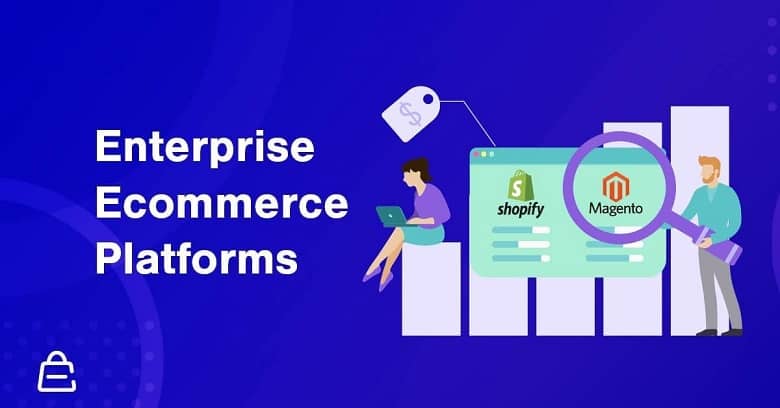No business can think to sustain today without the involvement of digital solutions. Millions of businesses shifting and accepting the mode of electronic data interchange are live examples of growing demand for enterprise eCommerce platforms. So let’s get deep into what is the concept of Enterprise Ecommerce Software and how they work and help grow our business.
An enterprise eCommerce software system is a comprehensive platform that helps large businesses control different departmental operations online and drive sales with efficiency. A reliable enterprise eCommerce software is one that will help large-scale organizations generate more revenue, through inventory management, and track customers, by providing a variety of solutions that are crucial for streamlining business operations.
Implementing a good eCommerce platform ensures a swift workflow of independent units in an organization that works as a single unit to achieve a common goal. It aims to make businesses run smoothly and create a productive workable space for everyone.
Types of E-commerce Software
1. Software-as-a-Service (SaaS) and Platform-as-a-Service (PaaS)
SaaS, generally called software as a service, is ready-to-use, cloud-hosted application software while PaaS, a platform as a service, is a cloud-hosted platform used to develop, run, maintain, and manage applications.
Both of these types of e-commerce solutions operate with the help of the internet and are the most reliable options for business owners who aren’t so tech-savvy. Anyone can avail of these services by paying monthly charges and transaction fees.
2. On-Premise platforms offer more control over their site.
An on-premises data center is basically a group of servers that you privately own and control. Such an eCommerce platform is locally hosted by the retailer and managed by their IT department. A few popular examples of on-premise solutions are Microsoft Office and Adobe products.
As this type of platform can be privately managed hence nowadays, more and more software providers are increasingly switching to on-demand models and software as a service. Besides, as they can be fixed easily by IT professionals their demand across various businesses is seen upscaling.
Doing this allows firms to gain more control over their site and create their custom storefront solution without much ado.
What to Look for in an Ecommerce Platform
The first and foremost step towards opting for an eCommerce is to identify a platform according to your business requirements. And while deciding which eCommerce can serve you better simply consider the below-given tips that will help you finalize the type of platform you must look for.
1. Always go for a simple interface:
An interface is something that allows users to engage with your site so opting for a simple UI is of utmost importance to enhance customer engagement and generate more prospects. Try avoiding interfaces that are a bit complex and require a little more technical expertise to navigate.
2. Find a design that aligns with your brand:
Always choose a design that reflects your brand and allows users to read clearly. The majority of eCommerce platforms offer numerous options to choose from and can be either free or payable. To summarize, use appropriate color, font type, and structure that make customers visit your site again and again due to its easy-to-navigate UI, well-displayed content, and planned structure.
3. Select a simple payment process:
Every person has set up a business with the intent of generating money (income). So, choose a payment processor, which is easy and simple to use on both sides. Doing this will help offer modern payment alternatives to your customers which will further aid in making transactions faster and more flexible.
Easy payment processes also minimize wait times and queues, thereby eliminating customer inconvenience, and making your brand appear more appealing in aspects of making use of modern payment technologies and keeping pace with the trend in the market.
4. Choose a platform that ensures security:
As cybercrime is becoming more common in this digital era, it’s very important to implement eCommerce software that safeguards you and your customers from becoming victims of fraudulent activities like data leakage, money theft, and more. Hence opting for a safe and reliable method is the need of the hour that can be fulfilled by using PCI security standards and SSL certificates.
Establishing and managing an eCommerce business on the web entails more than you actually think. It is a far more complicated process that requires the same level of strategic thinking and planning as running a physical retail store or a manufacturing facility.
Final Words
So whether you are planning to start up a business or are already an owner of a well-established one, implementing a reliable and secure eCommerce platform can help you ease the burden of the disorganized or unmanageable workflow system. Finding the right platform will help you get started and succeed in uplifting the visibility of your online store.
